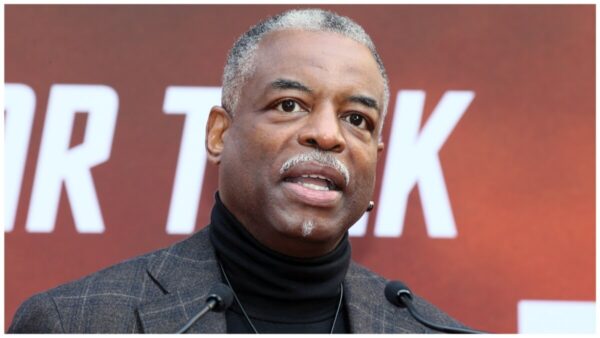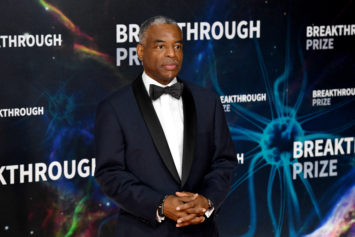“Reading Rainbow” star LeVar Burton got the unexpected when he discovered some hard truths about his family’s ancestry on a new episode of PBS’ “Finding Your Roots.”

The show was created with inspiration from Alex Haley’s television series, “Roots,” in which Burton starred as Kunta Kinte in 1977. But during the evocative 52-minute episode, host Henry Louis Gates informed Burton that his great-great-grandfather was a white man named James Henry Dixon.
‘I’d a fought you five minutes ago if you told me that I had a white great-great-grandfather. What!” he continued before yelling out “Kunta got white ancestry, what? Come on now.”
Burton was shaking as he learned that Dixon became a junior reserve soldier in the Confederate Army at 17 and his occupation was a farmer. “As a young man, James served to protect slavery but as an adult, he fathered a child with an African American woman who had been born into slavery,” said Gates, who then showed Burton a photo of Dixon, a white man with smooth hair.
Y’all, you have to see this! #FindingYourRoots Tonight! 8/7c on @PBS Thanks to @HenryLouisGates and team for the ride of a lifetime. #Kunta#MindBlown#bydhttmwfi pic.twitter.com/kUIMdk86t4
— LeVar Burton (@levarburton) January 16, 2024
Dixon reportedly had nine children and 40 grandchildren, some of whom are Black. Excited about learning his family’s history, Burton shared a clip from his interview on X, where one social media user shared his dismay at Burton’s shocking response to having a white family member remarks.
“It kinda seems super side ways that he’s got this much of an issue having white ancestors. Like dude you were on a show completely constructed around saying we get past petty things like that. There is nothing wrong with having white ancestry. ‘I’d have fought you’ yikes dude,” the social media user wrote.
Burton responded, saying, “Either you are an insensitive troll or you possess an acute lack of understanding of humanity. It is one thing to know something on an intellectual level, another matter entirely to be introduced to an emotional truth that is both surprising and wholly unexpected.”
Either you are an insensitive troll or you possess an acute lack of understanding of humanity. It is one thing to know something on an intellectual level, another matter entirely to be introduced to an emotional truth that is both surprising and wholly unexpected.
— LeVar Burton (@levarburton) January 17, 2024
Burton said his mother, Erma Gene Ward, “never wanted to share any of her history” with him or his sisters, therefore he was unaware of his family’s lineage. The PBS episode also revealed that his great-grandmother was a woman named Mary Sills, who was raised by a man she thought was her father as listed on her birth certificate. He said he was told she was of native American ancestry, but DNA testing was unable to trace his lineage to a man named Louis Sills.
Connecting the dots, Dixon was later found to be Mary’s biological father. Dixon also had a white wife and kids at the time. “And she was the other family on the other side,” Burton said in shock after learning he had a white ancestor. “Nooooo, I had no idea! So granny was half white?”
The longtime literacy advocate said he had been looking for an “entry point to talk to White America,” and he now believes he’s found it.
“There’s some conflict roiling inside of me right now, but also oddly enough I feel a pathway opening up,” Burton explained. “I have wanted for a long time, knowing what I know about the history of this nation, I’ve wanted especially in this current time frame. In this now moment, I believe that as Americans, we need to have this conversation about who we are and how we got here. But yet I see that we are so polarized politically and racially.”
He also discovered his father, Levardis Robert Lee Burton, was born in Cherry Valley, Arkansas, and raised by Burton’s grandparents, who allegedly had a tumultuous relationship. “Cycles do repeat themselves,” he added, noting that his mother and father divorced when he was just 11.
Burton was raised by his mother after the separation and he never saw or spoke to his father for decades. He also learned that his grandfather, Aaron C. Burton, and his great-grandfather, Pearl B. Burton, were both school superintendents. Pearl spent most of his life working in education and helped open a school for African-American children.
“I’m ecstatic, I can’t even explain how it feels to get this information. It’s like there have been pieces of me that have been missing,” said Burton as he teared up while talking about the importance of Black families openly sharing stories about their past.
He also learned that his great-great-grandfather Hal Burton on his father’s side, was a ladies man, He also discovered that Hal was elected into office in 1886 to serve on the Arkansas General Assembly. This was after the Reconstruction Act of 1867 bill was passed, allowing African-American men in former Confederate states the right to vote two years after the Civil War ended.

